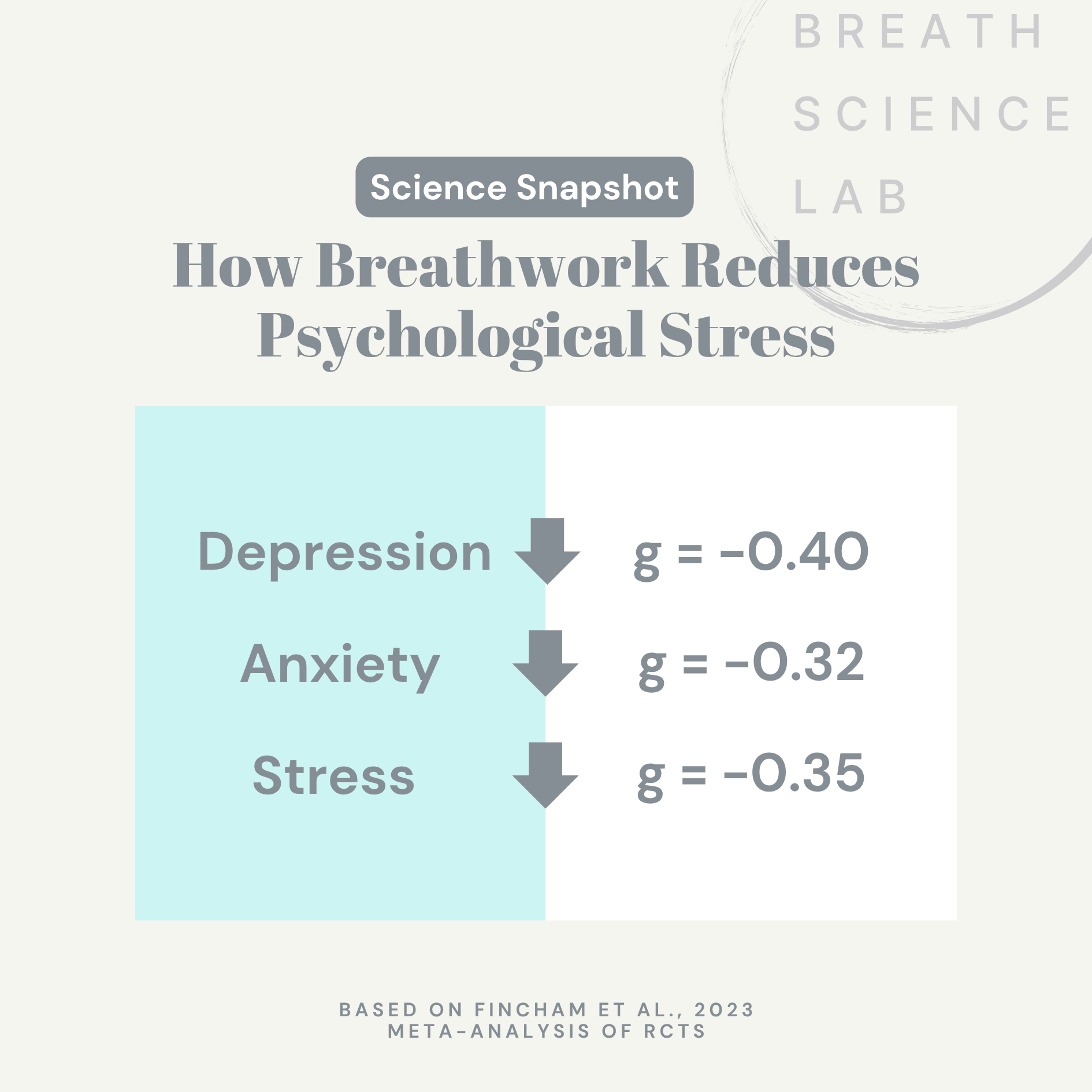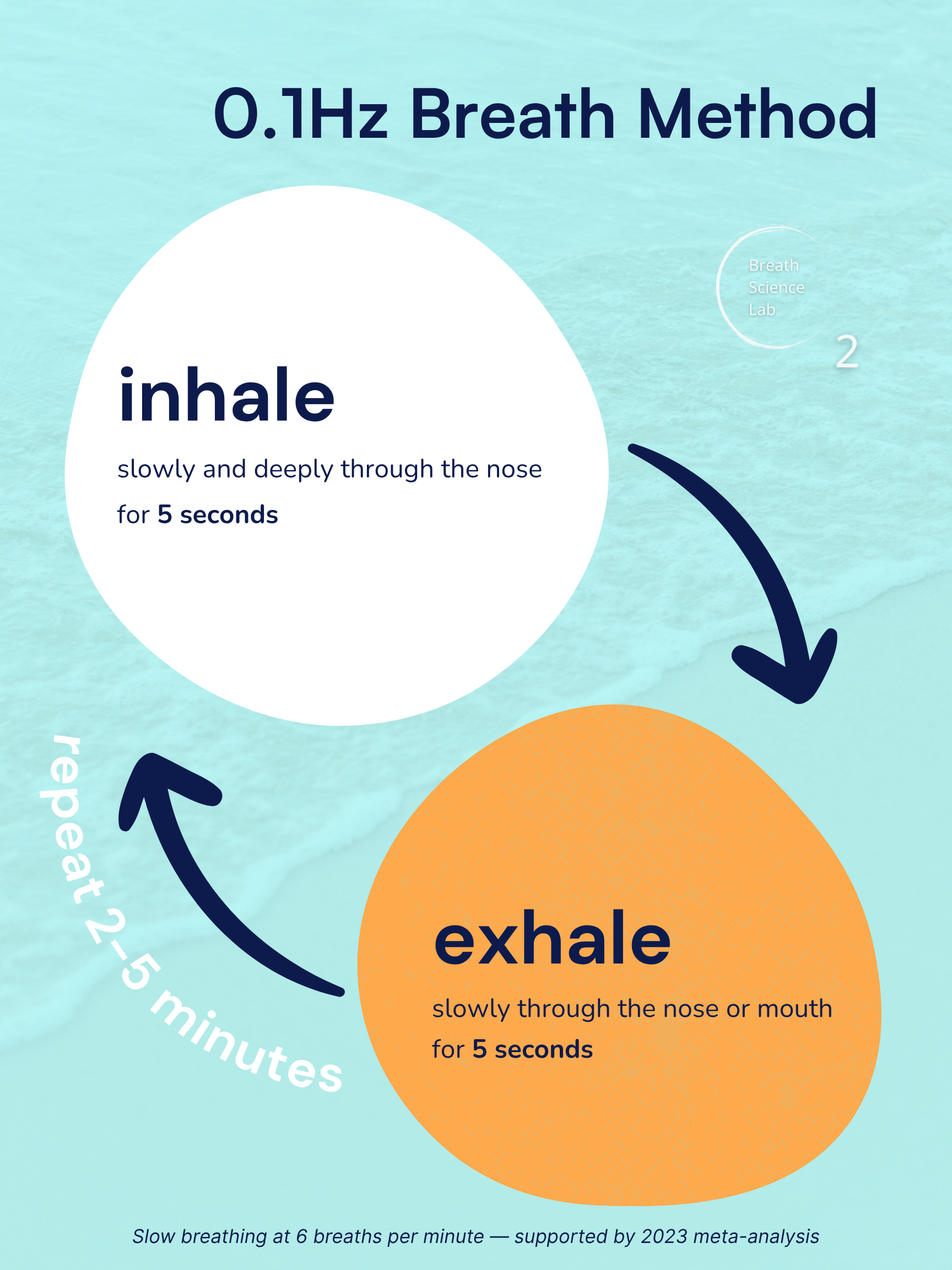Feeling Wired but Tired? Breathwork Might Be the Reset Your Nervous System Needs
If meditation hasn’t worked for you, slow breathwork might. Backed by a 2023 meta-analysis, this protocol helps lower stress, anxiety, and depression — and it starts with just 5-second breaths.

If your mind won’t slow down — even when you’re physically exhausted - you’re not alone. That “wired but tired” feeling is a sign your nervous system might be stuck in stress mode.
And if you’ve tried meditation or calming apps and still feel stuck, you’re not doing it wrong. Some nervous systems just need a different entry point. One that doesn’t require sitting still for 20 minutes or trying to “clear your mind.” One that starts with the breath - gently.
A 2023 meta-analysis of randomized controlled trials examined whether breathwork can measurably reduce stress, anxiety, and depression. The results? Small to moderate, but statistically significant improvements across the board.
Let’s break it down and show you a safe way to try it.
What Is Breathwork?
Breathwork refers to any practice where you consciously change how you breathe. This includes slowing it down, lengthening the exhale, or repeating a pattern.
Unlike meditation, breathwork isn’t about being still or clearing your mind - it’s about gently guiding your body toward calm. It works on the autonomic nervous system, which controls your stress and recovery states.
If you’re new to this work or not sure where to begin, start with Breathwork for Recovery: Unlocking the Power of Parasympathetic Activation.
What the Research Says
“Breathwork yielded a significant post-intervention between-group effect… denoting breathwork was associated with lower levels of stress than controls.”
— Fincham et al., Scientific Reports (2023)
Here’s what the researchers found from 26 randomized-controlled trials involving 1,370 participants:

(A randomized controlled trial, or RCT, is the gold standard for testing interventions — participants are randomly assigned to either a treatment group or a control group. A meta-analysis reviews data from many RCTs to see what consistently works across studies.)
- Stress (primary outcome): g = −0.35
- Anxiety: g = −0.32
- Depression: g = −0.40
These are meaningful results - especially for a low-cost, non-invasive practice.
The researchers also noted:
“It is possible that simply pacing respiration slowly at approximately 5–6 breaths/minute… can elicit similar effects [to HRV biofeedback].”
This is key. You don’t need expensive devices or complicated practices. Just slowing your breath to 5–6 cycles per minute (around 10–12 seconds per full breath) is enough to help your system shift toward calm.
Why It Works: The Vagus Nerve Pathway
Here’s the science behind it:
“As one inhales and exhales, heart rate increases and decreases, respectively. Higher HRV, arising from respiratory sinus arrhythmia, is typically beneficial as it translates into robust responses to changes in breathing and thus a more resilient stress-response system.”
That means your breathing patterns directly influence your heart and nervous system - and over time, build flexibility and resilience.
Slow breathing helps stimulate the vagus nerve, the main communication highway between your body and brain for calming signals.
If Breathwork Hasn’t Worked for You Before
You’re not alone. Many people - especially those with trauma, chronic stress, or anxiety - find traditional breath practices triggering or ineffective.
This isn’t your fault. Most techniques aren’t trauma-informed. If holding your breath or controlling your breath feels unsafe, you don’t have to push through it. There’s a gentler way.
Start small. One breath at a time. There’s no rush.
A Beginner-Friendly Protocol Based on the Research
The strongest results in the meta-analysis came from slow breathing at 5–6 breaths per minute. This pace - also known as 0.1 Hz breathwork - is one of the most researched breathing rhythms for calming the nervous system and increasing HRV (heart rate variability).
Try This: 5-Second Inhale, 5-Second Exhale
(Also called 0.1 Hz breathing - the pace reviewed in Fincham et al., 2023)
- Inhale gently through the nose for 5 seconds
- Exhale smoothly through the nose or mouth for 5 seconds
- Repeat this cycle for 2–5 minutes

This gives you exactly 6 breaths per minute - simple, smooth, and science-backed.
Do it lying down, seated, or in bed. No breath holds. No pressure. Just a safe rhythm your nervous system can settle into.
Want another gentle protocol? Try The 3-Minute Parasympathetic Reset You Can Do Right in Bed next.
Bottom Line: Breathwork Works - and It Can Be Gentle
This isn’t hype. It’s real research. Breathwork reliably reduces stress, anxiety, and depression - and you can start today, right where you are.
You don’t have to force calm. You can breathe your way there - slowly, gently, and safely.
Curious why some people don’t feel better with breathwork right away? Read: Why Your Nervous System Isn’t Recovering →
📚 Reference
Fincham GW, Strauss C, Montero-Marin J, & Cavanagh K (2023). Effect of breathwork on stress and mental health: A meta-analysis of randomised-controlled trials. Published in Scientific Reports.
👉 View the full study →

